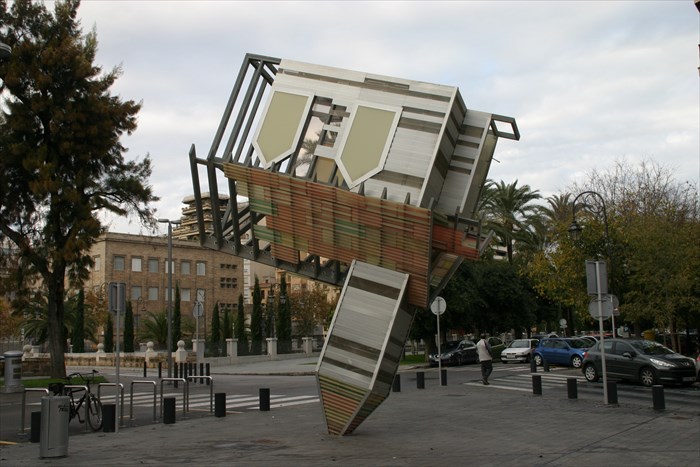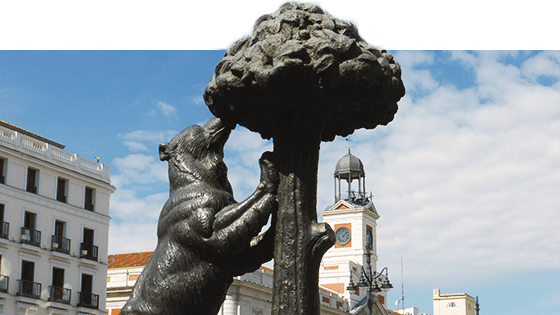
The photo is of a piece of art in Palma de Mallorca. A replica of the original created by Dennis Oppenheim, and called the ‘Device to Root Out Evil’. The original was objected to due to its choice of a church being turned upside down, but what better image to use? I certainly do not consider it to be sacrilegious but highly appropriate.
The sculptor chooses a very traditional shape for the building and with the spire driven into the ground it speaks volumes. The top becoming the bottom and the building not simply sitting on the land but into the land.
Paul might not have recognised the traditional shape but I think he might well have approved of the overall image. In Imperialism there is always a very clear ‘top’ or ‘centre’. From there all is shaped and controlled. Promises are made, with the clear framework that where there is compliance there will be reward, though the real beneficiaries are located at the centre. Other centres can develop, but they remain subservient to the main centre. Such centres only have carefully delegated monitored authority, certainly no authority is distributed. In the Imperial world of Rome there can be other ‘kings’ but Rome will remain the ‘city that rules over the kings of the earth’ and Caesar will continue unchallenged as ‘king of kings’.
The language of the NT Gospel is unmistakably political. Caesar is not only not acknowledged as ‘lord’ but Jesus is proclaimed as ‘Lord of lords and king of kings’. This is not because the Jesus message is a mirror of Rome’s, but rather Rome is being exposed as a pathetic parody of the real. The same words are used but the effecting of the reality is perverted by Rome with peace no longer coming through the life laid down, but through lives taken; the power overcomes, and if necessary through violence, rather than a submission to the violent powers. At the heart the contrast is of power enforced and of love extended.
The evil to be rooted out is indeed deep in the soil. It is an evil that enslaves one and all to a system, and the evil is so pervasive it is personified in Paul’s writings as ‘sin’ (singular) or in Revelation it manifests as a beast or beasts in union. An alternative structure, but one that is mirrored on the Babylonian top-down will not root out evil. Such a structure will eventually be used by evil as and when it proves helpful to do so, as it will not bring about a shift to the deep evil embedded in the soil. The church can never therefore be a comfortable bed-partner to the status quo, the subversive nature of it has to be present.
I propose then that Paul was crazy – truly crazy! He went to a place that already had an ekklesia, whose purpose was to serve the Imperial centre of Rome, and he went there with a conflicting message concerning the kingdom of God (basileia being the Greek word for kingdom, the same word equally used by Rome of her own ’empire’). On first hearing he must have sounded as a political insurrectionist whose time on earth was going to be limited. Yet there was some strange elements to the message. There was a ‘religious’ tone to it, and at the centre was a dead Jew whom Paul proclaimed was not simply ‘alive’ but risen from the dead.
His message was certainly political, but it could not be pressed into serving a particular wing (‘party’). What was clear was the message did not serve the status quo, for he was declaring that all hierarchies were not recognised ‘in Christ’. Not surprisingly the result was that ‘not many wise, not many noble’ were those who responded to the message! This irrelevant group should have been no threat to Rome’s order, and yet amazingly there were riots. Riots inspired by Jews were expected, for if Jesus was Lord he was not the one accursed of God but his name was now the only name through which salvation would come. (Acts 4:12 – ‘Salvation is found in no one else, for there is no other name under heaven given to mankind by which we must be saved.’ The ‘we’ both linguistically and contextually are Jews. No other name – not even the name of Abraham!) Jews reacting could be predicted, but a riot inspired by silversmiths (Acts 19)? This shows the extent of the impact (and understanding of the implications) of his message.
To narrow the work of Paul down to one element, such as he is creating a political movement, would be to be in error, but to avoid the obvious implication of the central political sound would be (in my perspective) to shift where the core of his message was.
Complex, complex, complex! To simply take the teachings of Jesus, the understanding of Paul’s Gospel and to proclaim them as shaping a new politic would not do justice to his Gospel, but to ignore that would be criminal!
We probably cannot give a simple answer to what on earth was Paul doing, but we cannot ignore his context of a one world government complete with its 666 mark of the beast; nor can we diminish his passion for a whole inhabited world (oikomene) to have opportunity to hear the message of hope.
It is very difficult to add the word ‘para’ to what followers of Christ are involved in, if they are motivated by something of this political (small ‘p’) vision and purpose. It is also quite difficult to give the word ekklesia to any group of those who want to use the term ekklesia in a way that only legitimises themselves.
We live at the end of the Christendom era. The apostolic calling is very strong whenever there is a shift. Perhaps we are in what will be viewed as the biggest shift in the civilisation of humanity. We might never know what on earth Paul was doing, but we will certainly have to figure out between us all what on earth are we to do. If it does not carry a political element with a vision for a transformed society it will be very hard to show that our message is faithful to the one Paul received from heaven.
The apostolic of every generation or situation have to rework the application of the Gospel without ever changing the Gospel itself. If we want to be faithful we will have to renounce hierarchy, be personally upended and immersed in the soil. Could there be a people who are called to root out evil? Could that be possible? If not, could there be a crazy gang who rose up (and went down deep) who were committed to a seriously thought out attempt to do so?




